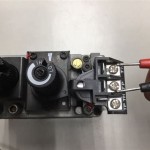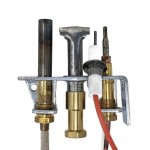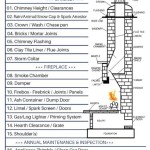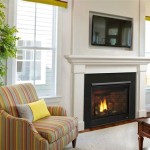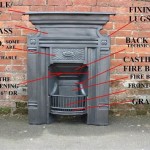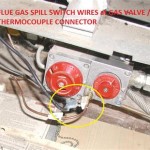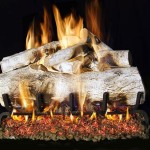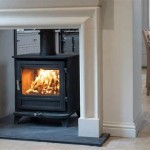Fireplace Insert Insulation: Enhancing Efficiency and Safety
Fireplace inserts offer a way to enhance the efficiency and aesthetics of traditional fireplaces. However, to maximize their benefits, proper insulation is crucial. Fireplace insert insulation refers to the materials and methods used to seal and insulate the space between the insert and the existing fireplace opening. This process contributes significantly to improved heating performance, reduced energy costs, and enhanced fireplace safety.
The primary purpose of fireplace insert insulation is to prevent heat loss and air leakage. Without proper insulation, a substantial amount of heat generated by the insert can escape up the chimney or into the surrounding masonry, rendering the insert less effective. Furthermore, gaps around the insert can allow cold air to enter the room, creating drafts and reducing overall comfort. Effective insulation minimizes these issues, ensuring that the heat produced by the insert is directed into the living space.
Selecting the appropriate insulation materials and employing proper installation techniques are essential for achieving optimal insulation performance. Different types of insulation materials offer varying levels of thermal resistance and suitability for fireplace applications. The installation process requires careful attention to detail to ensure a tight seal and complete coverage, preventing any air gaps or weak points in the insulation barrier.
Understanding Insulation Materials
A variety of materials can be used for fireplace insert insulation, each with its own advantages and disadvantages. The selection of the most appropriate material depends on factors such as the insert type, the size of the gap between the insert and the fireplace opening, and the desired level of insulation.
Mineral Wool: Mineral wool, also known as rock wool or slag wool, is a popular choice for fireplace insert insulation. It is a fibrous material made from molten rock, slag, or glass that is spun into fine strands. Mineral wool offers excellent thermal resistance and is highly resistant to fire, making it a safe option for use around fireplaces. It is also relatively easy to install, as it can be cut and shaped to fit snugly around the insert.
One of the key advantages of mineral wool is its ability to withstand high temperatures without degrading or releasing harmful fumes. This is particularly important for fireplace inserts, which can generate significant heat. Mineral wool also has good sound-dampening properties, which can help to reduce noise from the fireplace.
Ceramic Fiber Blanket: Ceramic fiber blanket is another commonly used insulation material for fireplace inserts. It is made from alumina-silica fibers that are spun into a lightweight, flexible blanket. Ceramic fiber blanket offers excellent thermal insulation and is capable of withstanding extremely high temperatures, often exceeding 2000°F. It is also resistant to chemical attack and thermal shock.
The lightweight and flexible nature of ceramic fiber blanket makes it easy to handle and install. It can be cut and shaped to fit around complex geometries and can be easily compressed to fill gaps and crevices. However, it's important to note that ceramic fiber blanket can be irritating to the skin and respiratory system, so it is essential to wear appropriate protective gear, such as gloves, a mask, and eye protection, during installation.
High-Temperature Caulk and Sealants: In addition to blanket or batt insulation, high-temperature caulk and sealants are often used to seal gaps and cracks around the fireplace insert. These products are specifically formulated to withstand the high temperatures encountered in fireplace applications. They create an airtight seal that prevents air leakage and improves the overall efficiency of the insulation.
High-temperature caulk and sealants are typically made from silicone or other heat-resistant polymers. They are available in a variety of colors to match the fireplace surround and can be applied using a standard caulk gun. It is important to choose a sealant that is specifically designed for fireplace applications and that is rated for the appropriate temperature range.
Vermiculite: Vermiculite is a hydrated magnesium-aluminum-iron silicate mineral that has been heated to expand it into lightweight granules. It is sometimes loosely packed around fireplace inserts to provide insulation. Vermiculite is fire-resistant and has relatively good insulation properties. However, it is less effective than mineral wool or ceramic fiber blanket, and it can settle over time, reducing its insulation value.
Vermiculite is relatively easy to install, as it can simply be poured into the space around the insert. However, it is important to ensure that the vermiculite is evenly distributed and that there are no gaps or voids. It may also be necessary to add more vermiculite periodically to compensate for settling.
Installation Techniques for Optimal Insulation
Proper installation is just as important as selecting the right insulation materials. Even the best insulation will be ineffective if it is not installed correctly. The following installation techniques can help to ensure optimal insulation performance.
Preparation: Before beginning the insulation process, it is important to thoroughly clean the fireplace opening. Remove any debris, soot, or ash that may be present. This will ensure that the insulation materials adhere properly and that there are no obstructions that could compromise the insulation barrier. It is also important to inspect the fireplace for any cracks or damage and to repair these before installing the insulation.
Measuring and Cutting: Carefully measure the space around the fireplace insert and cut the insulation materials to the appropriate size and shape. It is important to allow for a snug fit, but avoid compressing the insulation too much, as this can reduce its effectiveness. When using blanket or batt insulation, cut it slightly larger than the space to ensure a tight seal.
Sealing Gaps: Pay close attention to sealing any gaps or cracks around the fireplace insert. Use high-temperature caulk or sealant to fill these gaps and create an airtight seal. Focus on areas where the insert meets the fireplace surround, as these are common areas for air leakage. Ensure the sealant is properly rated for the temperature and meets the local building codes.
Placement of Insulation: Position the insulation materials carefully around the insert, ensuring that there are no gaps or voids. When using mineral wool or ceramic fiber blanket, wrap the insert completely, including the top, sides, and back. Secure the insulation in place with high-temperature tape or wire if necessary. If using vermiculite, pour it evenly around the insert, ensuring that it fills all available space.
Safety Precautions: Always wear appropriate protective gear when installing fireplace insert insulation. This includes gloves, a mask, and eye protection. Mineral wool and ceramic fiber blanket can be irritating to the skin and respiratory system, so it is important to avoid contact with these materials. Work in a well-ventilated area to minimize exposure to dust and fumes.
Benefits of Proper Fireplace Insert Insulation
Investing in proper fireplace insert insulation provides numerous benefits, making it a worthwhile endeavor for homeowners seeking to improve the efficiency and safety of their fireplaces.
Improved Heating Efficiency: The most significant benefit of fireplace insert insulation is improved heating efficiency. By preventing heat loss and air leakage, insulation allows the insert to heat the living space more effectively. This translates to lower energy costs and a more comfortable home environment. The insert operates more efficiently because it's not losing heat to the surrounding masonry or drawing in cold air.
Reduced Energy Costs: As the fireplace insert becomes more efficient, the need to rely on supplemental heating sources decreases. This leads to lower energy bills and significant savings over time. The reduction in energy consumption also contributes to a smaller carbon footprint, making it an environmentally responsible choice.
Enhanced Safety: Proper insulation also enhances the safety of the fireplace insert. By preventing heat from escaping into the surrounding masonry, insulation reduces the risk of overheating and potential fire hazards. It can also help to prevent the buildup of creosote in the chimney, which is a flammable substance that can cause chimney fires.
Increased Comfort: In addition to improved heating efficiency, fireplace insert insulation also contributes to increased comfort. By preventing drafts and maintaining a more consistent temperature, insulation creates a more comfortable living environment. The elimination of cold air infiltration makes the room feel warmer and more inviting.
Extended Fireplace Lifespan: By protecting the fireplace insert and surrounding masonry from extreme temperature fluctuations, insulation can help to extend the lifespan of the fireplace. The insulation acts as a buffer, preventing the insert and the surrounding structure from excessive thermal stress. This can help to prevent cracking, warping, and other forms of damage.
Therefore, fireplace insert insulation is a critical element for maximizing the performance, safety, and longevity of a fireplace insert. Selecting appropriate materials and following proper installation techniques will provide significant benefits in terms of heating efficiency, reduced energy costs, enhanced safety, and increased comfort.

Walls Behind Fireplaces Building America Solution Center

Electric Fireplace Insulation An Ultimate Guide Inserts Guy

Fiberglass Insulation Fireplace Insert 1 2 X 10

Rutland Fiberglass Fireplace Insert Insulation 10 Ft X 1 2 In At Tractor Supply Co

Walls Behind Fireplaces Building America Solution Center
Finally Got Around To Insulating My Fireplace Hearth Com Forums Home

2pcs Magnetic Fireplace Draft Stopper Vent Covers Screen Insulation Blocker Winter Indoor Prevent Cold Air Heat Loss Black 30 X 4in Limited Time Deals Temu

Chimney Liners Usa Fireplace Insert Venting Information

How To Insulate Prefab Chimney Interior Wall Greenbuildingadvisor

Fiberglass Insulation 1 5 Inch Wide And 10 Feet Long

